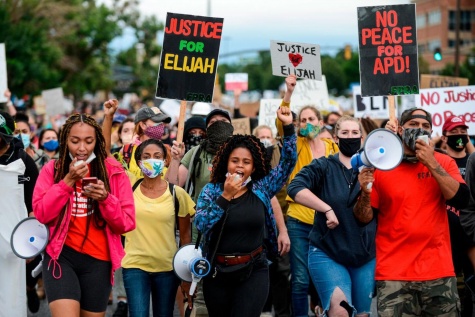
Reaghan Mulligan | Opinion Editor
February 28, 2021
On the night of August 19, 2019, the Aurora, Colorado Police Department received a 911 call reporting a “suspicious person” on the streets wearing a “ski mask and waving his arms,” according to the City of Aurora’s Investigation Report and Recommendations published on February 22, 2021. The caller acknowledged that the man, twenty-three-year-old Elijah McClain, was carrying no weapons, and that the caller felt no fear of being harmed. While the death occurred in 2019, a new investigation was instigated by Aurora in order to connect many of the unfinished lines of previous investigations occurring directly after the incident. This new report found flaws in practically every aspect of the initial assessment and report, and concluded that old reports “[were] flawed and failed to meaningfully develop a fulsome record” (Investigation Report and Recommendations from the City of Aurora’s Independent Review Panel).
Three police officers, Nathan Woodyard, Jason Rosenblatt and Randy Roedema, arrived on the scene, stopping McClain on his walk home. These officers stated that McClain was seen “acting suspicious,” and commanding him to stop in order to further investigate the situation. Within seconds, according to the Aurora investigation, Officer Woodyard “placed his hands on Mr. McClain.” The scene quickly escalated, and the “Decision to Frisk” (the officer’s decision to stop and pat down someone suspected of being armed and involved in a crime) McClain was eventually admitted to be influenced by his “suspicious” activity, as well as him being “overdressed,” neither of which are sufficient enough claims in a legal sense to initiate an investigatory stop.
The situation between the officers and McClain quickly progressed from hostile to violent, when McClain declined to a consensual stop by the police. The officers forcibly moved him from the sidewalk to the grass, with Officer Rosenblatt and Woodyard holding Mr. McClain by each of his arms, laying him down on the grass. Officer Roedma can be heard on the bodycam telling the other officers that McClain allegedly reached for the gun of one of them, this claim being one of the sole reasons that the assault on McClain ensued. According to Woodyard, as soon as he heard Roedma’s statement, his “objective changed to ‘take him down to the ground as hard as [he] could.’”
Officer Rosenblatt restrained McClain in a “carotid control hold,” where an officer induces unconsciousness by holding the sides of the neck, cutting off the brain’s flow of oxygen. A second restrictive hold was inflicted on Elijah while on the ground, waiting until he eventually passed out to cease their violent grip. At the same time, the recording body cams were either dropped or broken, leaving only the audio footage left.
Officers’ ability to use force such as this depends greatly on the actions of the individual, as well as whether or not the officer is in direct danger the moment a hold is instigated. The moment McClain was restrained on the ground, he posed little to no probable threat to the officers, meaning excessive restraint should be avoided. The threat that officers claimed Elijah posed was never explicitly clarified in the initial interviews after the incident.
The responding individuals to the scene inflicted excessive pain to Elijah McClain, whom the officers declared had “incredible strength,” despite his slight build and tone sounding “apologetic and confused.” Even after McClain was handcuffed and restrained on the ground, more violence ensued; one officer even threatened to “have a dog bite him.”
Aurora’s emergency medical services (EMS) arrived at the scene around ten minutes later, reportedly standing back and administering ketamine without attempting to inspect McClain for any bodily harm.
The new investigation acknowledges that the EMS administered a dose of ketamine based off a “grossly inaccurate and inflated estimate of Mr. McClain’s size,” which poses potential risk for sedation complications.
After the death of McClain, the initial investigation demonstrated severe carelessness and lack of accountability in regards to many of the questions asked, which flawed the prosecutor’s ability to determine whether or not the use of force was legally justified. Even before the release of this newer, more blunt investigation, the blatant use of excessive force was overtly against professional conduct. When hearing the words of the 911 call leading to this encounter, again, McClain was NOT labeled as a danger by the caller, nor did they feel threatened by his presence. The officers had no presumed reason to initiate any sort of force that occurred.
“The officers had no reason to arrest him in the first place, let alone use incredibly excessive force to pin him down,” sophomore Kayla McLaughlin said. “It is so sad to see, once again, police brutality towards Black men.”

Three main takeaways from the city’s intricate investigation stand out according to the DenverPost:
The officers had no justifiable basis to stop and interrogate Elijah McClain. There was no reasonable suspicion that a crime had been committed, or that McClain was posing any threat to himself or others. There was also no legal basis for inciting physical violence to restrain McClain—his initial actions were not that of a potentially dangerous person.
The actions of the paramedics were neither diligent nor well-judged. There was no inspection of McClain or any obvious form of assessment before the injection of ketamine. The dosage was inaccurate and immediately posed a threat to McClain’s health and wellbeing.
The internal investigation that followed his death proved to be below expectations in terms of depth. Detectives from the Aurora Police Department and the Denver Police Department failed to ask questions vital to the investigation and the court decision such as “how they justified the uses of force” against McClain. Many of the actions taken to initially look into the situation proved to be efforts to exonerate the police officers rather than truly bring justice.
“There was no accountability for those officers, their department and leaders failed them,” junior Bethany Padilla said. “Just as much as they failed the public.”
This investigation, which is not an account of legal responsibility for the death of McClain, was issued by the city to examine the details and choices of the paramedics and police officers involved at the scene. The hope with this investigation is to “lessen the chance of another tragedy like this one from happening again”.
The long overdue investigation gave Elijah’s mother, Sheneen McClain, proof that her son was innocent.
“My son’s name is cleared now. He’s no longer labeled a suspect. He is actually a victim,” she said.

Leave a Reply